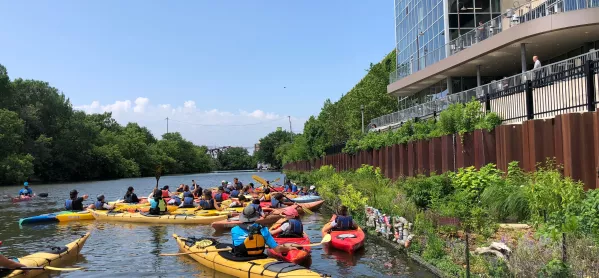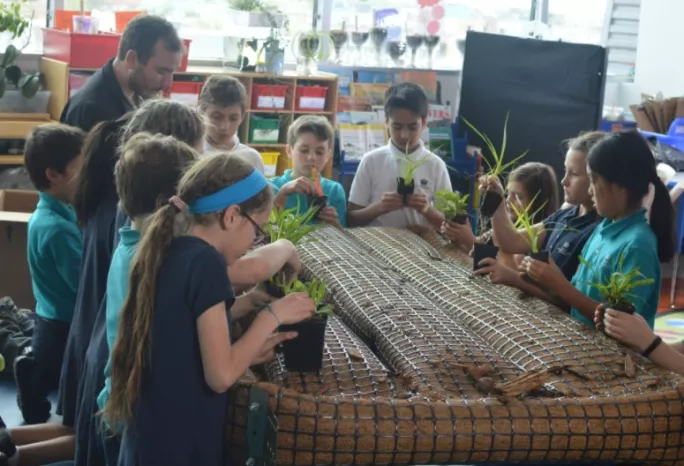
- Home
- Why community-based learning delivers big benefits
Why community-based learning delivers big benefits

I’ve fond memories of learning about my local village history in Year 4 when I was a student in rural Gloucestershire.
My teacher sent me up the lane with two friends to Mrs Haviland’s house to interview her about the history of the village.
I distinctly remember having a cup of squash and a biscuit with her, and then typing up the interview on our class BBC computer afterward.
Community spirit
This memory has stuck with me for so long because it was a chance to get involved with my local community and really feel part of it.
Now that I am a teacher, I’m always looking for ways to help our international pupils develop links in our local community so they too can have meaningful learning experiences that create memories that will stay with them long after they leave school.
I think this is particularly important in an international setting, where pupils could easily spend time in a location without ever really getting to know it.
River work
And so, in 2017, our school formed a partnership with a not-for-profit organization called Urban Rivers, which is involved in the re-wilding of a branch of the Chicago River. They build floating riverbanks to bring wildlife and biodiversity back to the Chicago River.
It struck us as the perfect opportunity to get our students out and into the world around them to really learn about the river and its history, while casting an eye to conserving the biodiversity for its future, in a way that makes the community around them become a very real and tangible thing.
So by working with Urban River we had soon organised for our Year 5s to:
- Research local wetland plants to fill floating planters
- Learn about the positive and negative impact that humans can have on the environment
- Take a kayak trip along the river to visit some of the already installed floating gardens
- Design an outdoor, floating, learning platform
- Take part in a planting event with the team at Urban Rivers.
In addition to this, we documented the whole project with an award-winning video - see below.
This was all linked to the new International Primary Curriculum unit of work called Go With the Flow where we would teach Year 5 about local wildlife and habitats but this was not the sole purpose - it was a good complementary fit but, for me, the most important element was about them getting out into the world beyond the school gates.
Indeed, the impact of this collaboration on our students includes:
- Building a sense of belonging to the local community and neighbourhood.
- A growing understanding of local wildlife.
- Developing their sense of responsibility to look after nature.
- Exposing them to a genuine, local, community improvement project.
Subsequent Year 5 cohorts have taken part in this collaboration too, which is now entering its fourth year.
Going virtual
The project has grown beyond installed planters to the development of a ‘Wild Mile’ of river. Inspired by our student’s designs, a floating park is being built for the public to access, and other schools in the area are looking to bring their students to the project.
Sadly, this year, of course, our collaboration has been postponed owing to Covid-19. Nevertheless, we are looking to work in a virtual capacity with Urban Rivers, and exploring options on working with a local video game design company on a game design project.
While it is now challenging for projects like this to happen, we shouldn’t see it as a barrier to working with local experts, institutions and charities.
After all, virtual meeting software can bring experts right into the classroom and how much more impactful this is when they are talking about something local students can visit - whether with school or family.

Look around you
You can also be proactive and reach out to a local shop or business could use some help coming up with a marketing campaign highlighting their home delivery service for residents?
Or how about having students help a local wildlife charity with a citizen science project, counting birds they see visiting feeders or building nests boxes?
What about organizing food drives to help families affected by food shortages in the local area? Maybe whole school communities could be mobilized to clean up beaches, in a socially distant way?
Or just keep your eyes open for opportunities: I’ve just returned from lunch, where I bumped into some people tending to a bird who had struck a window. I suggested window decals may help prevent this and suggested they drop us an email if they wanted some local children to be involved in designing them.
Whatever you do, and however you do it, getting involved with local communities has numerous benefits and can create memories for pupils that last a lifetime.
Tom Collins is a primary science specialist teacher and Steam departmental leader at the Nord Anglia British International School of Chicago - Lincoln Park
Register with Tes and you can read five free articles every month, plus you'll have access to our range of award-winning newsletters.
Keep reading for just £4.90 per month
You've reached your limit of free articles this month. Subscribe for £4.90 per month for three months and get:
- Unlimited access to all Tes magazine content
- Exclusive subscriber-only stories
- Award-winning email newsletters
You've reached your limit of free articles this month. Subscribe for £4.90 per month for three months and get:
- Unlimited access to all Tes magazine content
- Exclusive subscriber-only stories
- Award-winning email newsletters



